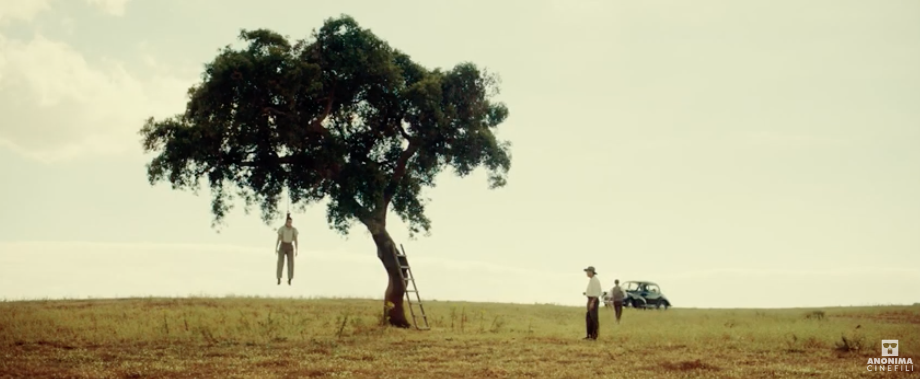by Cláudio Alves

The Domain opens with the sort of scene that works as a mission statement. Its first image seems like something out of a western, a vast landscape, the horizon slashed by the silhouette of a great big tree. From one of its branches, a body hangs by a noose. It’s the eldest son of the rich owner of all the land we can see. The father, far from being heartbroken, watches on dispassionately, a glint of disappointment in his eye.
In an act of cruelty, the patriarch forces his youngest son to confront the corpse of his brother, his weak brother. Frightened, young João runs away from the morbid tableaux, taking refuge in the mossy ruins that stand in the middle of a nearby river. Death, parental cruelty, coldness confused with strength and an escape from the horror of reality to the warm embrace of a long-forgotten past - such are the main themes of this epic, shot like a western and paced like a funeral...

27 years after the prologue, in 1973, João has taken up the role once occupied by his father. He’s a powerful landowner who looks down with disdain at any signs of weakness, especially when they come from his infant son. He is cold and he is arrogant, behaving like a king that’s progressive enough to refuse the demands of the fascist rulers, but not to so that he’ll recognize the plight of his underpaid farm-hands.
In his own head, João might be a hero, but both the audience and the film see through the lies he tells himself. Even if he thinks he’s Rhett Butler mocking the foolishness of the warmongering confederates, we know he’s actually Scarlett O’Hara, pampered and delusional, standing on a hill while refusing to believe her life is falling part as long as she has Tara. Not that he’s as interesting as Scarlett, of course.
If I might be so bold as to invoke another classic historical epic, The Domain is more The Leopard than it is Gone with the Wind. Like that portrait of 19th century Italy, it uses the story of a rich man becoming aware of his own obsolescence to reflect on the History of a country. Tiago Guedes even includes a showy party scene that might not be as magnificent as Visconti’s ballroom sequence but is remarkable nonetheless.

Around one hour into The Domain, João and his despondent wife, Leonor, attend her younger sister`s wedding. In an elaborate long take, Guedes shows us the reception, full of government officials, including the father of the bride, and other wealthy parasites drunk on their own privilege. None of them knows it yet, but their time is coming to an end. By dawn, a new Portugal will be born, for the wedding happens on April the 24th 1974, the day before the Carnation Revolution.
This formally ostentatious scene is the last hurrah for the old order, after which The Domain and the country enter a new act, one that starts with revolution and ends with the baptism of a bastard child. The third and last act jumps to 1991, when the children have grown and collect what their parents sowed. To be honest, after this last time-jump the film does start to drag -- Its 146 minutes are strongly felt.
That said, it’s easy to understand why The Domain was chosen to represent Portugal at the Oscars. It’s visually beautiful and the cast is uniformly great, especially Albano Jerónimo and Sandra Faleiro. At times, the film seems a bit self-conscious of its own importance, but there’s a genuinely epic dimension to this Portuguese tragedy, both thematically and emotionally. The Domain is an original story, but it feels like an old literary classic. The sort of tomes which are chores to read through, but leave us with the elated feeling we’ve experienced something great, beautiful and poignant after we’re finished with them.
Do you think The Domain will be Portugal’s first Oscar nominee?